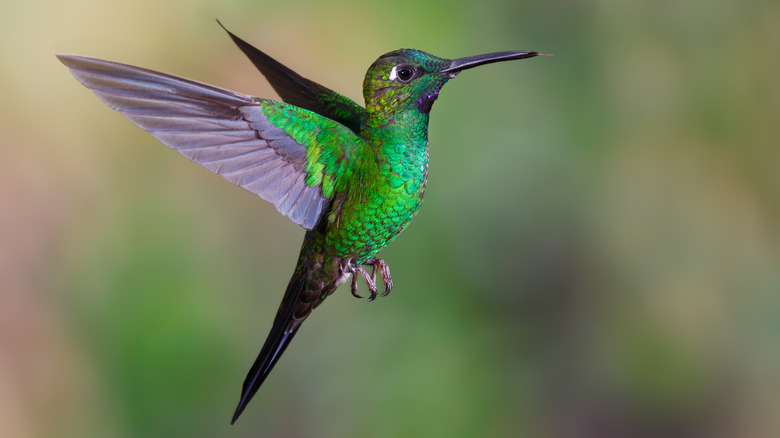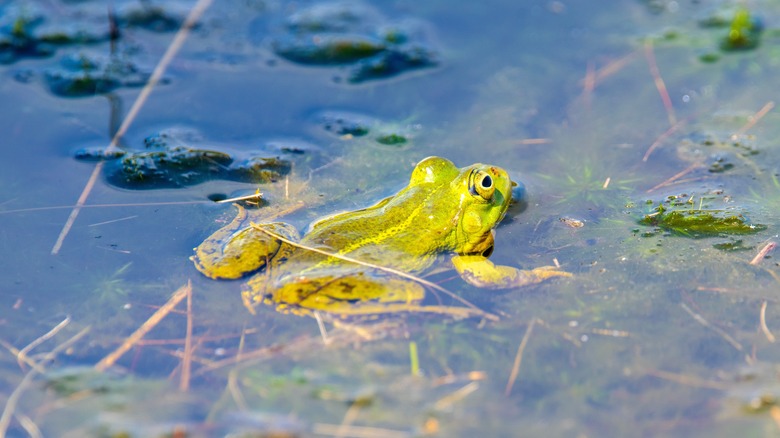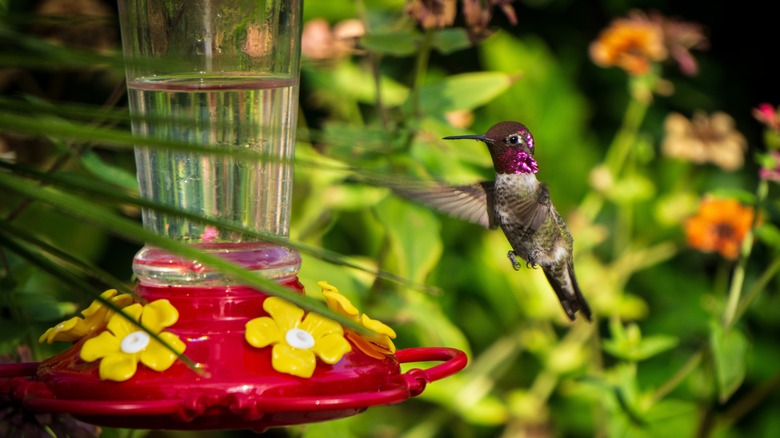If You Live Near Water, Be Wary Of This Hummingbird Threat
Have you recently installed a hummingbird feeder and been enjoying watching them zip around? If you love to watch hummingbirds, you're not alone. These speedy birds are a lot of fun to watch and also greatly benefit your garden by pollinating flowering plants.
But while you may have already put effort into attracting them to your yard by planting flowers that hummingbirds love and putting up a feeder, it's also important to watch out for predators. A variety of animals will try to make a snack out of a hummingbird if given the opportunity — this includes snakes as well as predatory birds such as hawks. However, another threat to your new feathered friends that you may not expect is frogs.
Frogs have quite an appetite and have been known to eat hummingbirds if given a chance. Although this may not be the most common threat the small birds face, it is one to be aware of if you live near water. If you want the hummingbird population in your yard to thrive, you may want to take some steps to protect them and should consider whether or not it's worth repelling frogs from your yard.
Frogs may eat your hummingbirds
Various types of frogs may eat hummingbirds, but some are likely better at it than others. Bullfrogs, for example, are quite large and have been known to eat the small birds. There are various moments when this amphibian may be able to get close enough to a hummingbird and make their move. When the bird flies close to a pond and hovers near the spot a frog happens to be, it may be able to take the hummingbird by surprise.
Some frogs may even go directly to where these small creatures like to congregate rather than wait for them to appear. They may cling to a nectar feeder and then strike when the time is right. Frogs are capable of eating other large prey as well; in addition to hummingbirds, other small birds have also been known to get eaten by them. Of course, success varies. In some cases, a hummingbird will be a frog's last meal. They won't be successful and both may die as a result – a frog may choke on a large meal such as a hummingbird. Even if they don't die immediately, the meal can become a gastrointestinal foreign body (GIFB) or cause gastrointestinal overload (GIO). This will distend their stomach and may cause difficulty breathing. Their intestines may also rupture and this may cause sickness or death after a bit more time has passed. The frog will likely begin to experience signs of these conditions within 24 hours.
How to keep frogs away from hummingbird feeders
Hummingbirds will potentially be vulnerable if you have a large frog population around your home. However, carefully consider whether you want to take steps to get rid of the carnivorous amphibians since they can be beneficial to a yard. Deterring frogs from your garden isn't a good idea since they can eliminate many pests, including beetles, slugs, and grasshoppers. Just one frog can eat more than 10,000 insects during the course of a summer. However, although they may eat hummingbirds and insects, other birds, fish, and animals will eat them as well. They serve as a great food source for wildlife on your property.
Despite this, if you still want to prioritize the hummingbird population, there are ways to repel frogs and reduce their numbers. To control their population, ensure any ponds or water features you have are kept clean, and get rid of any standing water in your yard. To repel the amphibians, you can also spray the area with an equal part vinegar and water solution. This will sting a frog's feet and be unpleasant for them. While you may choose to spray this mixture all over your yard, you may simply want to target certain areas to keep your hummingbirds safe. Although you shouldn't clean your hummingbird feeder with vinegar, you may want to put some nearby to deter their hopping predators. The addition of vinegar to the area can keep frogs away and give your hummingbirds the best chance of staying safe.


